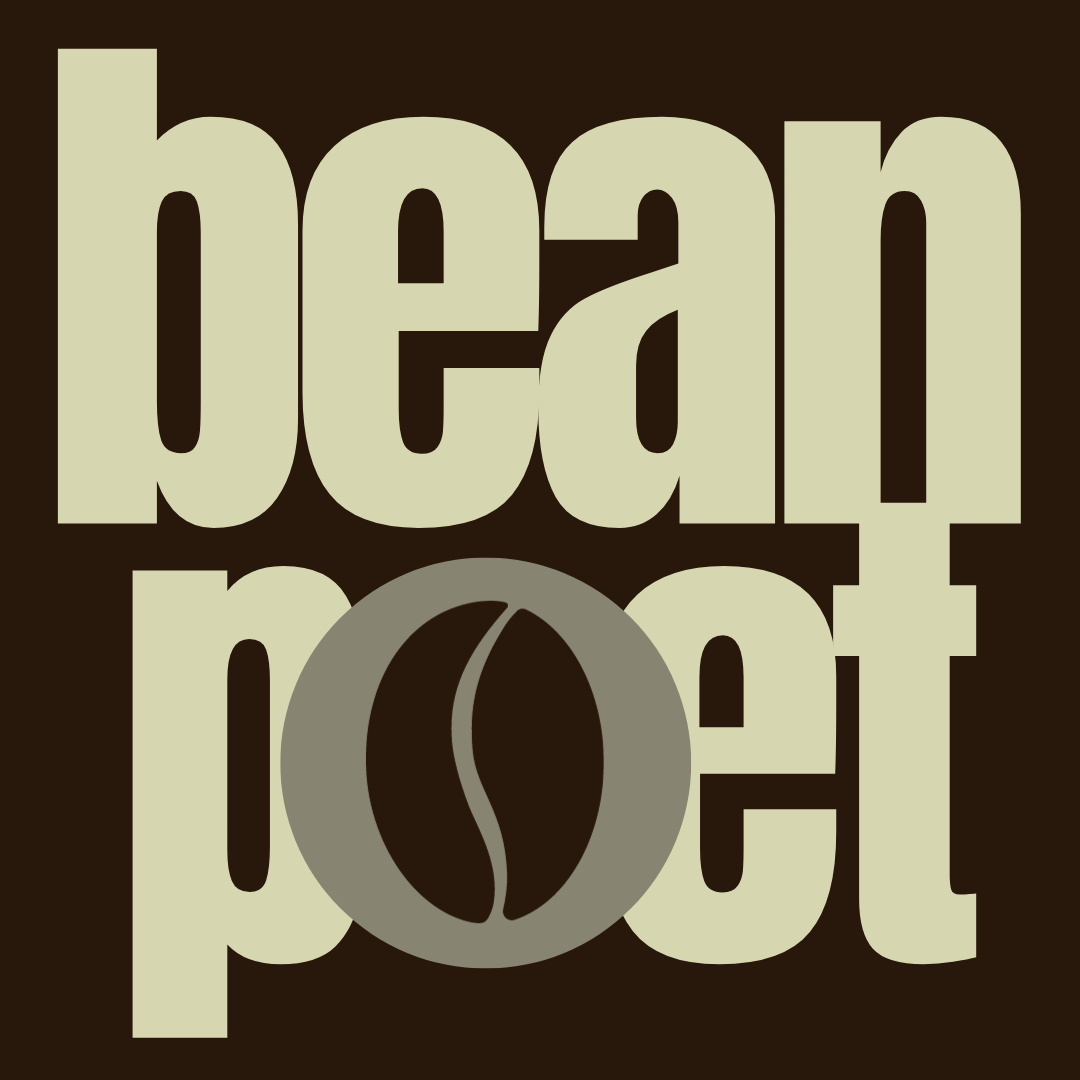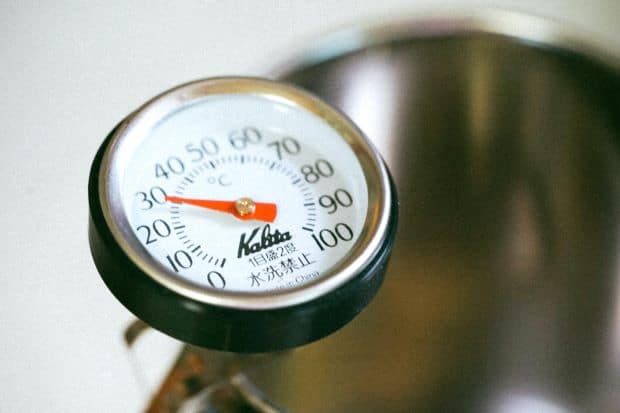Last Updated on December 10, 2023
Coffee brewing might seem simple, but the process is actually quite complicated.
A commonly overlooked factor that has a huge impact on the flavor of your brew is the temperature of the water.
Contrary to popular belief, there’s actually a perfect coffee brewing temperature.
Even subtle changes—down to the degree of the water—can change the taste of your beans.
In this post, we’ll tell you everything you need to know about capturing the right temperature for your brew.
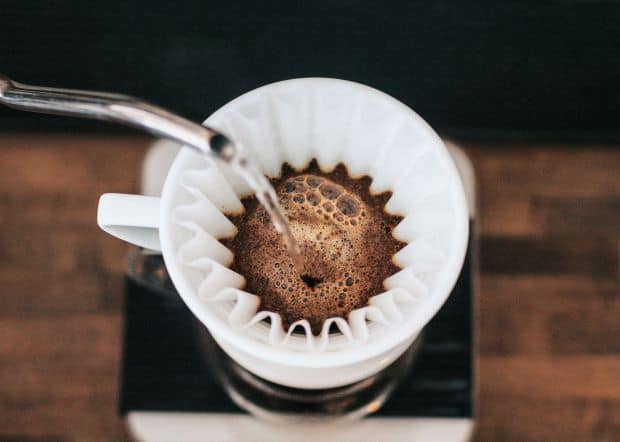
Why Does Water Temperature Matter When Brewing Coffee?
Coffee beans contain complex flavor compounds, including solids and oils. Coffee brewing temperature is important because the water temperature works to extract different flavors from the coffee beans and determines the time it takes for the flavor to be extracted from the coffee.
Have you ever wondered why cold brew coffee produces such a unique coffee taste? This is because the temperature of the water extracts particular flavors from the beans.
Infusion is a process by which water constantly flows through the coffee grounds. Immersion is a method where the coffee grounds are completely submerged in water. These two processes can affect the flavor of the coffee.
Looking at the cold brew process, we know that water at colder temperatures takes a long time to complete the flavor extraction, whereas hot water extracts flavor much quicker. Near-boiling temperatures can extract the flavor of coffee in about 2-4 minutes without ruining the taste of the coffee. Cold brew coffee that uses room temperature or colder water can take up to 24 hours to extract the full flavor from the beans.
We use hot water more commonly to brew coffee for a number of reasons. It’s much quicker, for starters. Most people want their cup of coffee in minutes instead of hours. Hot water also dilutes certain flavor compounds and oils in the water more quickly, and it delivers the deep, tasteful flavor that people think of when they think of hot coffee.
These days iced coffee and cold coffee are popular, but these drinks need to be brewed differently to bring that rich coffee flavor at a different temperature.
While there is no way to bring out the complete flavor of coffee beans, certain methods and temperatures can capture different flavors that may be more palatable.
Getting the right coffee brewing temperature
Here are 3 unique methods you can use to get the right brewing temperature for your needs:
Method 1: Boiling Water
Boiling water works well in terms of efficiency, heat lost, and consistency.
Water is boiled at a specific temperature, so even if you don’t use a measuring tool, you’ll see when the water has reached the necessary temperature. Consistency is important for making subtle changes to your process and for brewing a quality cup of coffee every time you need one.
This method is extremely efficient because hotter water is better at dissolving and extracting compounds. By using boiling water, you’re able to extract more coffee flavor from your beans. You can simply boil water in a kettle without having to worry about the temperature.
This method also works well because heat is lost as you pour the water. Technically, the water is not boiling by the time it touches your beans. With methods such as a pour over filter or French press, the water temperature can drop before it hits your grounds.
Certain materials can cause varying temperature drops as well. The water temperature will drop considerably more with a ceramic cone than if you use a plastic cone, since a ceramic cone has more thermal mass. When brewing your coffee, it’s important to note which tools you’re using, so you can adjust your temperature as needed. You can also preheat your coffee-making devices to alleviate some loss of temperature.
With the boiling method, getting your water to an optimal temperature requires little to no hassle. You can do it half-asleep in the morning.
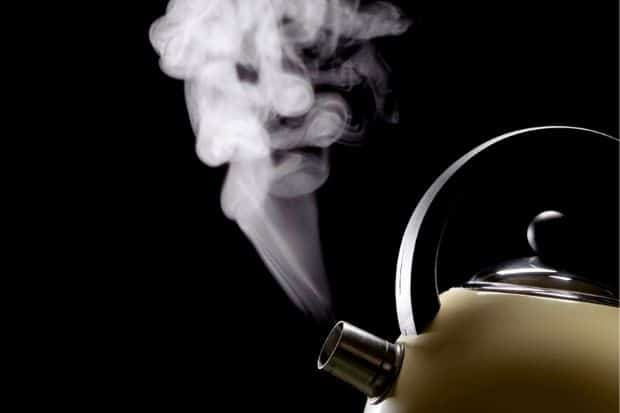
Method 2: The So-Called Perfect Temperature
Coffee lovers and coffee experts have long debated whether or not there’s a perfect temperature to brew coffee at. Professional baristas and researchers generally agree that the optimal coffee brewing temperature is somewhere between 195 F and 205 F, depending on the type of coffee and the temperature of your coffee beans or ground coffee. People in colder climates should aim for the higher range, since the grounds are most likely colder than room temperature. This closes the gap between the two temperatures. In general, the closer water gets to 205 F, the more flavor it extracts.
To get the exact temperature that works best for you, first determine the temperature your beans are stored at, then try out different brewing temperatures within the recommended range until you find the sweet spot.
Method 3: Adjust Temperature Based on Brew Type and Means
This method is the most meticulous and may contradict the other methods, but keep in mind that there are many factors that influence what temperature you should brew your beans at.
Bean type is important in determining what temperature you should use. Similar to tea, some coffee beans have different flavor profiles that can be brought out with different temperatures.
The roast degree also complicates the temperature at which you should brew your coffee. Roasting takes your coffee to a certain degree, and different temperatures can bring out different notes.
The brewing method is also very important in determining the right temperature. There are many ways to brew a cup of coffee, and the materials of your device can affect the temperature. So you should adjust the temperature of your water according to the brewing process and method you use.
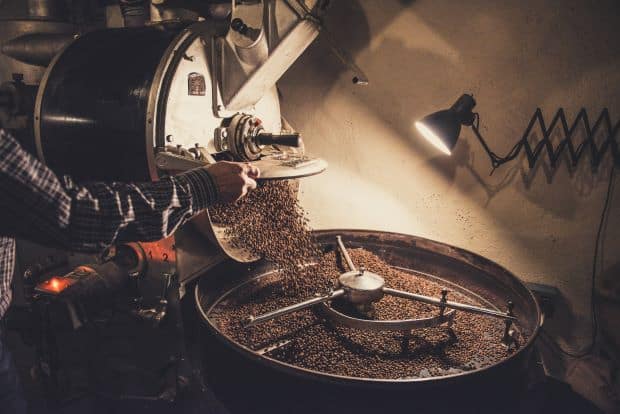
Does Hotter Water Give You Stronger Coffee?
The simple answer is: to a certain extent.
It’s true that hot water brings out a lot of the flavors that coffee has to offer. The hot water breaks down the beans and unlocks all the flavors that we crave.
Water that is close to boiling can break down more of the coffee compounds, resulting in a stronger coffee flavor. Water beyond that point can actually bring out too much flavor from the coffee beans, which can destroy the coffee quality and flavor.
Coffee flavors are complex. Coffee contains not only the flavors we love, but also bitter flavors and acidity.
Does Elevation Affect Ideal Water Temperature?
Absolutely. Most of us don’t need to worry too much about this, but some people may need to adjust.
Water boils differently at different elevations. At higher elevations, the pressure decreases, which decreases the boiling point.
The next time you go camping, you can impress your friends by tweaking your coffee recipe to brew the perfect morning cup that fits the elevation. Here’s our list of the best high altitude coffee makers out there right now.
Conclusion
To find the perfect coffee brewing temperature, you have to keep in mind all the factors that influence the taste of coffee. We recommend starting out in the ideal temperature range of 195 F-205 F and making small adjustments from there. Once you find the perfect temperature for your beans, you’ll notice the change in taste.
Happy brewing!
